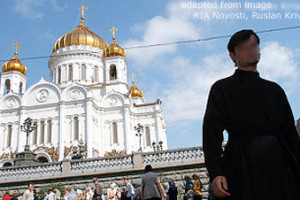Most Russians Want State to Remain Secular

(Moscow Times – themoscowtimes.com – Jennifer Monaghan – June 25, 2015)
The majority of Russians want to live in a secular state but almost half of the population is happy for the church to influence societal morality, a survey by state-run pollster VTsIOM has found.
Sixty-four percent of those polled said they were in favor of the continued separation of church and state, as enshrined in the Russian Constitution, VTsIOM revealed Wednesday. Eight years ago this figure stood at 54 percent.
But while almost two-thirds of the population was found to favor secularism, almost half of those polled by VTsIOM (47 percent) said the church should be allowed to influence the moral and spiritual life of society, but not politics.
While 32 percent said the church should not be allowed to interfere in state affairs or society, 14 percent believed it should play an active role in these spheres, VTsIOM found.
Just 12 percent of those polled by VTsIOM voiced support for the re-establishment of a legally mandated state religion, down 1 percentage point from 2007.
Russia is officially secular, but the church and state have drawn closer in recent years. A law passed in 2013 makes it illegal to “offend the feelings of religious believers” – a threat recently used to derail the performance a controversial opera in the city of Novosibirsk.
A version of Richard Wagner’s opera “Tannhauser” that focused on the unknown years of Jesus Christ’s life was pulled from the Novosibirsk Opera and Ballet Theater’s repertoire after religious activists declared it to be blasphemous. The theater’s director also lost his job after vocally backing the production, leading critics to question the effects of the religious law on cultural freedom.
About two-thirds of Russians identify as Russian Orthodox Christian, according to a survey carried out in December 2013 by independent pollster the Levada Center.
The VTsIOM survey was conducted on May 16-17 among 1,600 people in 46 Russian regions. The margin of error was no greater than 3.5 percent.
